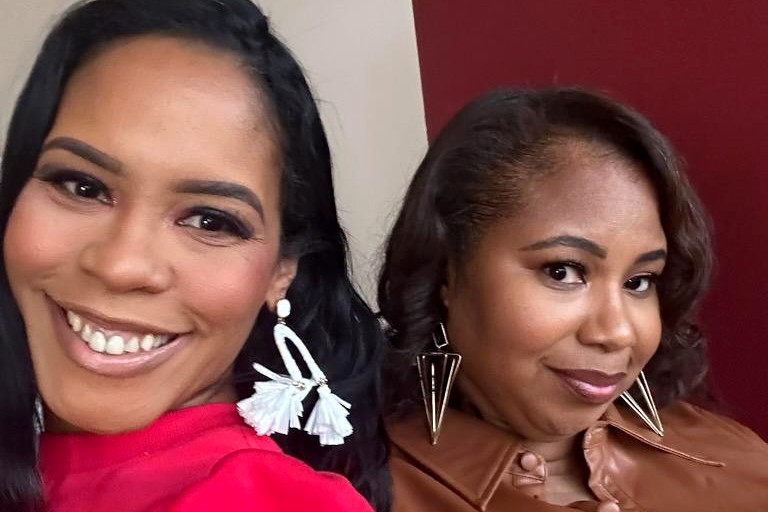
Scholar, author, activist, and visionary builder, these are just a few words to describe Tamura Lomax, Foundational Associate Professor, who came to Michigan State University to work alongside Ruth Nicole Brown, Inaugural Chair, to envision and build the new vanguard Department of African American and African Studies (AAAS).
Good timing and the extraordinary opportunity of creating a new department with a special focus on Black feminism gave Lomax all the incentive she needed to take on this new role at MSU.
“I was at a point in my life where I was ready to return to the academy,” she said. “I’d left academia in 2015 for work/life and scholar/independence balance, and though I was away focusing on the things and people I loved, I never abandoned the dream of engaging in academia.”
We are here, taking up space, explicitly and unapologetically centering and weaving Black feminism, from our charter to our values to our curriculum to our bylaws to our engagement with one another. This matters.
This dream fulfilled is augmented by the groundbreaking work being done, that, in itself, Lomax says, is a dream.
“The opportunity to build a Black Studies department alongside some of the baddest Black feminists out there – and thusly a department that refuses to ‘lose our mothers’ (Hartman 2006) – is wondrous,” she said. “Also, anyone who knows the history of Black Studies knows that the AAAS emphasis on Black feminism is necessarily rebellious. We are here, taking up space, explicitly and unapologetically centering and weaving Black feminism, from our charter to our values to our curriculum to our bylaws to our engagement with one another. This matters. The possibilities for this sort of vision and command of space, along with the faculty, drew me in immediately.”
The Scholar
Lomax received her Ph.D. in Religion from Vanderbilt University, where she specialized in Black Religious History and Black Diaspora Studies. She also has an expertise in Women, Gender, and Sexuality Studies, and Black British and U.S. Black Cultural Studies.

“This work stands at the matrix of loudness, resistance, artistry, and sovereignty,” she said. “And at the center of all of this are Black people and all the ways we insist on both surviving and living well.”
Lomax also has a Master of Divinity and Master of Theology from Emory University, and in her early years thought she wanted to be a Christian counselor. However, once she began her master’s program, she said she was “radicalized in the river of womanist theology, Black theology, and all things Black,” which “changed [her] life.”
Art fills a room visually. Rebellion is loud. The rebellious artist rooted in radical Black feminist politics makes room for others – while standing ground. This is what my work does.
Today, her research focuses on rebellion, art, freedom, and taking up space.
“Art fills a room visually. Rebellion is loud. The rebellious artist rooted in radical Black feminist politics makes room for others – while standing ground. This is what my work does. It’s about painting new pictures, constructing new messages, and calling forth new worlds. It’s about being accountable to my ancestors while thinking about how big I can draw, how loud I can be, and how far into the future I can dream,” Lomax said. “This is what being a free Black feminist scholar of religion and culture means to me.”
The Author
As an independent scholar, Lomax published her first single-authored book, Jezebel Unhinged: Loosing the Black Female Body in Religion and Culture, in 2018 with Duke University Press, which was 16 years in the making.

This critically acclaimed work explores how Black women and girls have been stereotyped as “Jezebels” in the Black Church and in Black popular culture. She writes in the book that “Healing the Black Church will require ceaseless refusal of the idea that sin resides in Black women’s bodies, thus disentangling Black women and girls from the Jezebel narratives’ oppressive yolk.”
Prior to Jezebel Unhinged, Lomax published Womanist and Black Feminist Responses to Tyler Perry’s Cultural Productions in 2014 with Palgrave Macmillan, a book she co-edited with Rhon S. Manigault-Bryant and Carol B. Duncan, which analyzes from a variety of interdisciplinary perspectives, Tyler Perry’s body of work, including plays, films, and television series.
My first two books focused on Black women and stereotypes in religion and popular culture. My current book examines Black boys, masculinity, and white supremacy. In each of these texts, I’m trying to imagine new worlds that aren’t overdetermined by the latter; where Black folks take up space freely, unapologetically, joyously, and uninterrupted.
Her latest book, Parenting Against the Patriarchy: Raising Non-Toxic Sons in White Supremacist America, to be published by Duke University Press in the near future, begins with an open letter to her two teenage sons in which she pours her heart out letting them know “that the primary genocidal threat that endangers all life is not Black women, but rather white supremacist capitalist heteropatriarchal masculinity.”
“My first two books focused on Black women and stereotypes in religion and popular culture. My current book examines Black boys, masculinity, and white supremacy,” Lomax said. “In each of these texts, I’m trying to imagine new worlds that aren’t overdetermined by the latter; where Black folks take up space freely, unapologetically, joyously, and uninterrupted.”
The Activist
In 2017, Lomax co-organized “Our History, Our Future: A Multigenerational Conference on Human Rights” with scholar, queer activist, and Associate Dean for Community Life and Lifelong Learning at the time, Pamela Lightsey, at Boston University, which brought together 1960s Civil Rights and Black Panther Party activists with Black Lives Matter activists.

After Lomax had lamented on Facebook that the Black Panther Party and Black Lives Matter (BLM) movement needed to come together for critical and generous conversation and understanding, Lightsey saw her post and sent her a message, saying let’s do it.
“I had the vision and she had the money. We brought 1960s Civil Rights and Black Panther Party activists together with BLM activists for a two-day private retreat/public conference to help iron out some of the differences,” Lomax said. “What I learned from this was that this work would have to be an intentional lifelong project to be effective. While we did some really good work in those two days, it was not enough. Intergenerational Black radical collective politics, ethics, accountability, and trust are established over time.”
The Visionary Builder
Throughout her career, Lomax has worked tirelessly to help drive the Black women’s movement forward. She is the co-founder of The Feminist Wire (TFW), an online feminist publication dedicated to providing a socio-political-cultural critique of anti-feminist, racist, and imperialist politics, and continues to serve as its visionary and CEO.

TFW was first conceived in 2010 while Lomax was a doctoral student and was launched the following year, growing to an annual readership of 1.5 million at its height.
The vision of TFW is to “tell the other side of the story — the one white mainstream media refuses to tell,” Lomax said. “This work was and continues to be life changing. We are a trusted source of knowledge production and certainly helped launch a few careers. But more than that, we gave the public critical everyday feminist analysis at a time when it really did not exist. There were very few other sites doing this work. We were all on the vanguard. TFW helped make intersectional feminist discourse pop and assessable.”
My role is to not only raise the critical conscience of students but the institution. My personal hope is to influence a sea of connected critics that go on and change the world. Because they understand that all that they are learning is not solely for their personal success. It’s for the good of all the living.
This visionary collaborative work informs the work Lomax is doing with AAAS.
“The work we are doing here means to take up space in Black Studies and MSU in a very distinctive way,” Lomax said. “The department is made up of fiery visionaries. Our collective role is to build. Our individual roles both differ and overlap. I bring my previous visionary leadership and TFW experiences. I know what it means to charter new ground and take up space not initially meant for you – and then to make that space not only appealing but the standard that others defer to…My role is to not only raise the critical conscience of students but the institution. My personal hope is to influence a sea of connected critics that go on and change the world. Because they understand that all that they are learning is not solely for their personal success. It’s for the good of all the living.”


